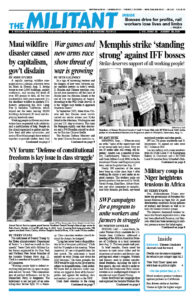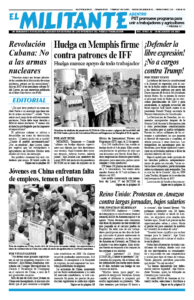As working people in Ukraine exert courageous efforts to reconquer parts of their country seized by the Vladimir Putin regime in Moscow, they are strongly motivated to defend their independence. At the same time, workers and oppressed nationalities across Russia are becoming increasingly disaffected from Putin’s war.
At the heart of these developments is the national question. The Ukrainians were oppressed for centuries by Russia’s czars. They won autonomy for a few years after the 1917 Bolshevik Revolution led by V.I. Lenin. Then they came under the iron grip of Moscow again as the counterrevolution headed by Joseph Stalin took hold. Ukraine regained its independence in 1991 after the Soviet Union disintegrated.
Putin blames Lenin for the creation of Ukraine as a nation. He insists it has no right to exist. But over the last decade Ukrainians have proved the opposite, fiercely fighting for their sovereignty.
Following revelations of a series of corruption scandals, Ukrainian President Volodymyr Zelensky announced Aug. 11 that the chiefs of all regional army recruitment centers would be fired. They will be replaced with “warriors” from the front, he said, who have “lost their health, lost their limbs,” but who have “retained their dignity and have no cynicism.”
Meanwhile, the Kremlin is cynically using draftees, especially from the oppressed nationalities, as cannon fodder in its effort to crush Ukraine. An estimated quarter of a million Russian workers and farmers in uniform have been killed or wounded over the past 18 months.
For every death from Moscow, proportional to the population, there have been 87.5 from Dagestan, Russia’s southernmost republic; 275 from Buryatia; and 350 from Tuva. The latter two, in eastern Siberia, are among the poorest regions of Russia, whose people are mainly of Asian origin.
The most frequent protests against the war’s toll have been in these regions by relatives of those in the army. The national question raises its head again.

